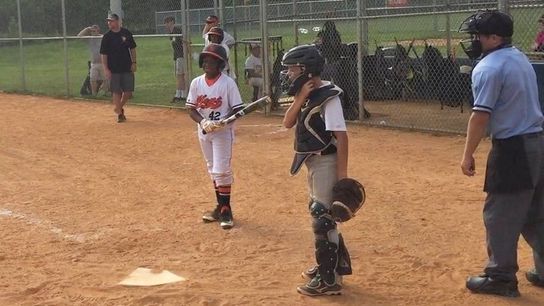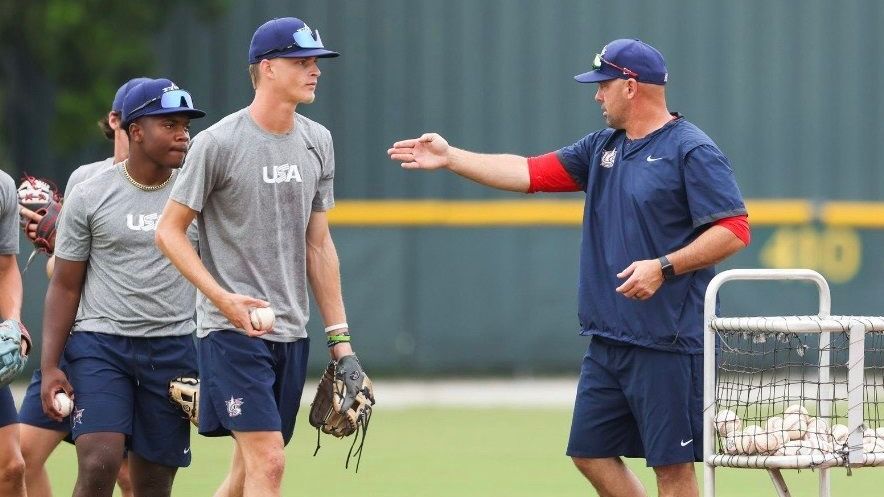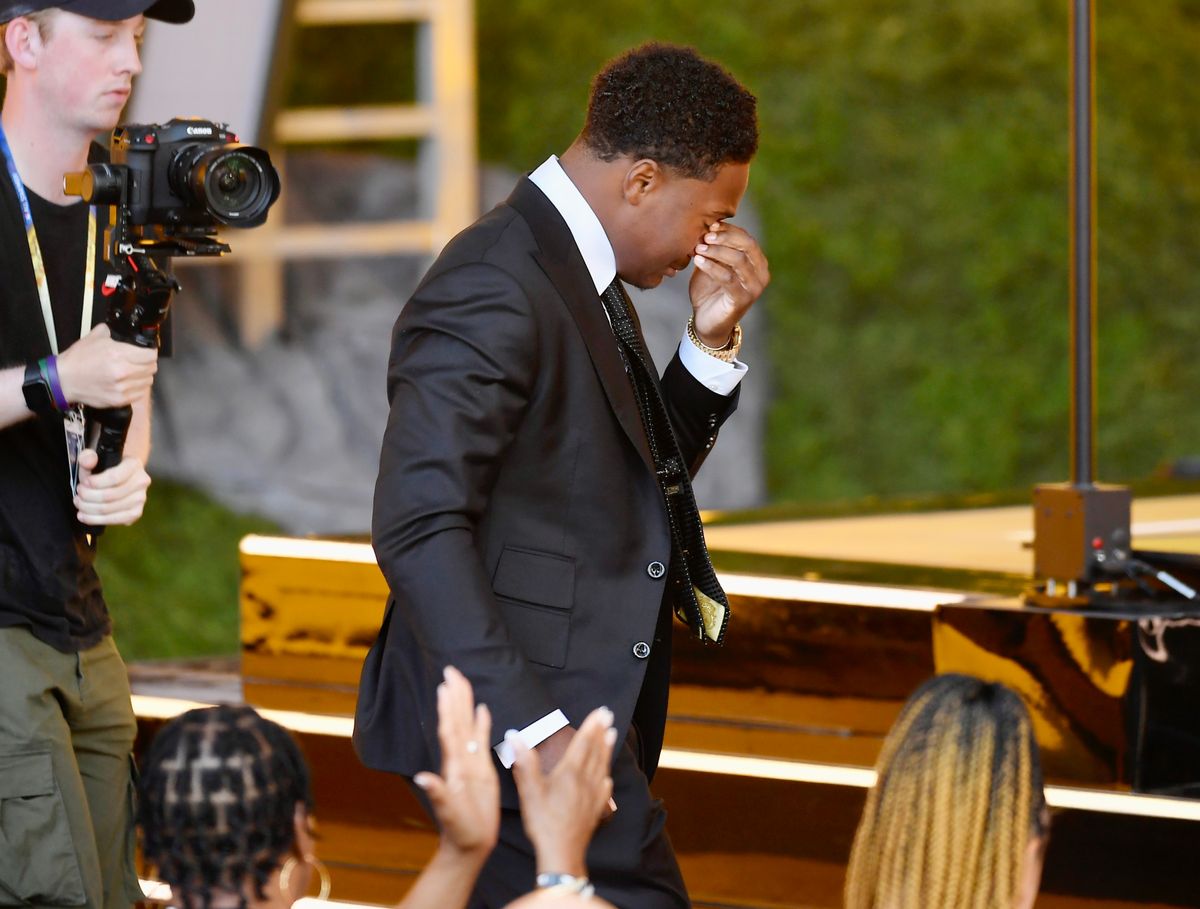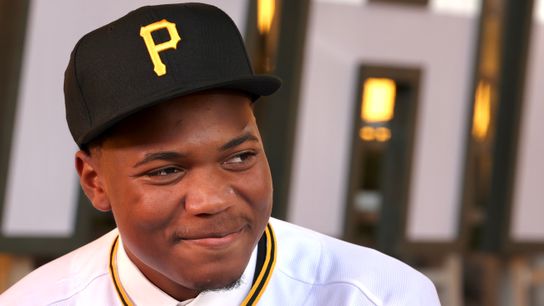LOS ANGELES – His grandmother named him.
All of Terry and Kim Johnson’s sons’ names started with “Ter,” like their father. Tervont was the oldest, then Tervell and Terrenz.
But they didn’t expect to have four boys.
“You’ve done everything with my name,” Terry told her. “What are you going to do with him?”
“I had no more names,” Kim said. “My mom actually named Termarr in the hospital.”
Terry liked it, and the fourth Johnson boy carried one of the family's traditions. He’d go on to carry another: The family’s love of baseball.
Fast forward 18 years, one month and six days, and Termarr was selected by the Pirates’ fourth overall in the Major League Baseball Draft this past Sunday at the Xbox Plaza. It was there that he declared himself “the best player in the draft.” Prior to that night, Baseball America named him the best hitter in his class. When he signs and officially becomes a member of the Pirates’ organization, he’ll be regarded as one of the best prospects in the system and in all of baseball.
Termarr’s baseball journey is far from over, but when he hugged Rob Manfred on the outdoor stage Sunday at dusk, it signified the start of a new chapter. Of his time as a professional. Of being one of the most watched and exciting young baseball players in the game. The next chapter of a journey that began, quite literally, the day he was born.
Because when the other boys met Termarr for the first time, Tervont brought a gift. He had homered in his Little League game that day, and he wanted his baby brother to have the ball.
“I feel, like, coming out of the womb I was always destined to play baseball,” Termarr told me at Dodger Stadium. “I felt like I was destined to play this game since he gave me that ball."
____________________

COURTESY OF KIM JOHNSON
Termarr Johnson steps to the plate in a little league game.
Tervont taught him how to hit.
They learned by playing ball in the house. When Terry and Kim were newlyweds and moved into their Atlanta home, they didn’t have much dining room furniture. The room stayed mostly empty, and when they started having kids, that space and the living room became play areas for the four sons.
Terry was a swimmer, football and baseball player growing up. Kim played softball. Sports were an important part of their lives, but after breaking some ribs playing football, Terry hung up the pads and got into sports marketing and coaching. To stay out of the Atlanta heat, Terry found it was just easier to coach his sons indoors. That involved them just playing baseball in the house.
First base was the vanity. The collection of school supplies was second base. The front door was third base. Home plate was the couch. You were allowed to peg either the runner or the base with the ball to get an out.
“Imagine the walls just beat up,” Terry said, describing the scene.
“It was intense, archaic baseball,” Tervont said.
If someone got in trouble, the defense was, “Well, Daddy made the rules!”
“I’m not sure that I officially let them,” Kim said on how they convinced her to let them play. “It just kind of happened.”
After a few broken windows, Kim instituted some new rules, including using a rubber ball instead of a baseball to try to minimize the damage. It worked for a bit, but as the four grew up, the windows started breaking again.
“He taught me there,” Termarr said of the swing. “Just being bad kids playing baseball in the house.”
The results spoke for themselves. Termarr was drafted in the first round. Tervell is transferring to Arizona State University to play ball, and Termarr said on draft night that he’ll be a draft pick of the Pirates in 2023. Tervont played at Georgia State and Georgia Tech. There were some real ballplayers in that living room.
Tervont grew up watching Robinson Canó play and tried to mimic the swing. As he grew up, he studied other hitters as well, focusing on George Brett and Barry Bonds in particular. With them in mind, his own swing started to take shape and evolve.
“As I got older, I started to understand the mechanics and what to look for in what they do,” Tervont said. “Then I started passing it down.”
“I have the same swing as him,” Termarr said. “He doesn’t have the same swing as me.”
Tervont disagrees. Termarr’s swing is more refined.
The key lies in the lower half. Listed at 5 feet 8, he doesn’t have the stature, but draws his strength from there.
“He didn’t need his hands to get to the baseball,” Tervont said, adding of the lower half, “That’s where you get the power, the contact at the highest levels. That’s where you get the projections of 30, 35 bombs, .300 batting average."
Then there was the mental side of the approach. Termarr's going to get at least four at-bats a game. Each presents a new opportunity.
“Seize every opportunity,” Tervont taught him. “That’s what we tried to put in him. That same mentality that inside the box, outside the box. Every day, wake up and see opportunity.”
With a foundation to work with, Tervont became the coach, and Termarr his prize pupil. Hundreds of swings a day later, and Termarr was, as Terry put it, “swinging with bad intentions.”
“He was trying to make my swing work for me, make sure I do the right things,” Termarr said. “It’s a different swing when you’re swinging a metal bat or a Drop 10 or an actual bat. He always taught me, use my legs, use my hips. Don’t use my hands so much. Work on that. Use my whole body, use my legs to make my swing look easy.”
Termarr would get other hitting instruction, like from local coach Carl Nichols, who helped him develop a hitting routine. Termarr’s first swings of the day are with a 36 or 40 oz bat. Nichols said that Termarr could swing a “twig” – a 32-ouncer – in games, but Bryce Harper got strong by swinging a big bat. He should do the same. The drill work they would do strayed from the traditional tee work and focused more on that lower half. Focused on refining what works with his swing.
Because it turns out that Tervont, six years Termarr’s senior, was coaching a future first-round pick.
“Seeing the whole dynamic of it, and the maturity of the older one to teach and the younger one to be willing to listen, it’s been rewarding to see that,” Kim said.
____________________
His brothers made him a better player.
When Termarr was four and playing t-ball, his second-oldest brother, Tervell, was playing in coach-pitch ball with eight year olds. One day, Tervell’s team was down a couple players. Since Termarr was already at the field in his Little League 'Dodgers' uniform, he was asked to join the team so they could play.
The goal was to put him in left field and hope the ball didn’t find him. That wasn’t the case. In the top of the first, a kid hit a fly ball out to left, drawing cheers from the crowd. Termarr went back on the ball and caught it basket style.
The coach was blown away. As Termarr came into the dugout, the first words out of his mouth were, “Where do I hit?”
That was the story of Termarr’s early years in baseball. Originally, his brothers and their friends wouldn’t want to pick him because he was so much younger. As he got older, he became the first pick. When he was needed at a certain position, he was moved there.
“When I was the only kid on my team who could catch the ball, I played first base,” Termarr said. “Then I went to catcher because of all of those passed balls. My dad got tired of them. I had to go catch it. Over time, I got to shortstop because it was a position where they needed help.”
“He had no choice but to get better,” Terry said.
At shortstop, Termarr became a leader on the diamond, where his natural confidence showed. It’s a trait Terry worked to instill in all of his sons.
“I tell them, 'You want to believe in yourself,'” Terry said. “Know you’re the best in the room, on the field and let your work speak for itself. If you have that confidence and the work shows it, then it’s self-explanatory at that point.”
Termarr showed that confidence after being selected during draft night, and before then, on the field. Last July in a Perfect Game National showcase at Tropicana Field, he came up to bat and told everyone in his dugout – which included the Rays' Tyler Glasnow – that he was going to hit a home run.
“I don’t think I had ever done that before,” Termarr said.
He followed through, pulling a 94 mph fastball to right for a home run. When he got back to the dugout, he was playfully ribbed and congratulated for calling his shot.
Termarr Johnson (@JohnsonTermarr) is locked and loaded. 💣 #PGNational pic.twitter.com/37EbfpWAD9
— Perfect Game USA (@PerfectGameUSA) July 16, 2021
“I’m a confident guy, but I try to keep it humble, but to call my shot and actually do it, it was kind of cool,” Termarr said as his smile widened. “Really cool.”
That confidence is apparent in his play, according to a coach of his from last year: Jack Wilson, the Pirates' standout shortstop.
“He’s so confident in himself, and not in a cocky way,” Wilson told me. “He’s not obnoxious. He just has full belief in who he is and what he can accomplish and what he can do. When the lights are on and he’s on his biggest stage, that’s when he was at his best.”
____________________

COURTESY OF JACK WILSON
Jack Wilson (right) works with Jackson Holliday (center) and Termarr Johnson at a Team USA event.
Wilson taught him his fielding routine.
Wilson is now a coach for Team USA, a national baseball team that fields competitive clubs to compete against international competition in different age groups, including high school. Last summer, he got to work with three of this draft class’ top players: Shortstop Jackson Holliday, outfielder Druw Jones and Termarr.
He was first struck by Termarr’s talent in a match against Team Canada. With the bases loaded in one of the biggest games they played, he took the pitch the other way and cleared the fence.
“You just don’t see that at that age,” Wilson said. “He’s a junior in high school, he’s taking a wood bat and flipping it opposite field 360 for a grand slam in a big international game. That was my big ‘wow’ moment with him.”
It was the second time Termarr left a lasting impression on Wilson. Before games had started but after Termarr had made the team, the two had a conversation at the water cooler. Wilson told him he was close with the Pirates organization, and since they would pick early, it could be a landing spot for him.
“What do I tell them when they ask me about Termarr Johnson?” he asked.
“They’re getting a winner,” Termarr responded. “They’re getting a guy who’s going to do whatever it takes to win a baseball game.”
“Well, that’s a pretty good answer,” Wilson thought.
He had the attitude and the bat. He needed guidance on the field. That’s where Wilson excelled as a player, and in their five weeks together, the two developed a routine.
Ground balls in. Ground balls deep. Third to first throws. Double plays. Backhands. Charging. They went over it all, and at a new position at third because Holliday was at shortstop. The temporary change in position benefited him, allowing him to see the ball sooner off the bat.
“When you’re at third base, your reaction time needs to be A-1,” Termarr said. “Needs to be great. He taught me a lot about that.”
The Pirates took notice as well. While Johnson was labeled by Baseball America as a second baseman, and it could be his position in the future, his new team is going to give him an opportunity at his natural shortstop position.
“He's worked harder than many high school kids do on the defensive side of the game,” Ben Cherington said over Zoom.
Shortstop is a pretty deep position organizationally for the Pirates, including top prospect Oneil Cruz in the majors and top 100 prospect Liover Peguero in Class-AA Altoona. Termarr’s position will likely be a point of discussion moving forward. Cherington said the Pirates were only focusing on taking the best player available instead of drafting by position. Wilson doesn't view any position change as a problem and says he can succeed anywhere on the diamond.
“He’s got the hands, he’s got everything you need,” Wilson said. “He’s got the feet, he’s got the arm. It’s just, OK, where does he fall? Does he play short, does he play second? We put him at third at USA. You can literally put him anywhere and he’s good at it.”
And if Termarr ends up one day playing the same position at PNC Park like Wilson? “I would love that,” Wilson responded.
“That age is so offensive driven,” Wilson said. “ ‘I’m one of the best hitters’ type of thing, and everybody feels that way when they’re swinging a bat. But that defensive part is what set him and Jackson and Druw apart.”
That’s part of the reason why the three rose to the top of draft prospect boards — Wilson could have seen any of them going 1-1. Mock drafts confirmed that feeling, with there being plenty of shuffling between the three for the first overall pick in the months leading up to the draft.
The Pirates, however, picked fourth.
Wilson compared the situation to a fantasy-football draft. In any given year, there is usually some debate about which of three running backs should be the first overall pick. The guy picking fourth still has a chance of getting a first-overall-pick type of talent.
“It just takes that guy taking Travis Kelce,” Wilson said.
Secretly, Wilson wanted Johnson.
“He’s a hard worker,” he said, before referencing Pittsburgh. “Blue collar-type guy. It’s a perfect fit, really.”
During the draft, Holliday and Jones were selected with the first two picks by the Orioles and Diamondbacks. Then the Rangers shocked the baseball world by taking right-hander Kumar Rocker with the third pick.
Wilson jumped out of his chair at home. The Pirates had a chance to get Johnson.
“Oh my gosh, please let us get Termarr,” he thought.
The Pirates didn’t take long to make their pick, and Termarr had a home.
Wilson celebrated, recognizing how special this pick could be. Back in his playing days, he and his double play partner, Freddy Sánchez, watched a young Pirates prospect take batting practice one day and were blown away by his athleticism. Termarr reminded Wilson of that prospect.
“His name was Andrew McCutchen."
____________________

GETTY
Termarr Johnson sheds tears of joy after being drafted Sunday.
Kim had taken him to Dodger Stadium before.
When Termarr was two years old, his family took a vacation to Los Angeles. One stop was to go to a Dodgers game, but they hit terrible traffic on the way and didn’t get to the stadium until about the seventh inning. Termarr was asleep in his carseat by that point, so his grandmother stayed in the car with him while the rest of the family caught the final few innings.
On Monday, a half day removed from the draft, they returned to the ballpark.
“Driving up to Dodger Stadium, I could feel the memory of that,” Kim said.
The night before, Kim could tell that the normally calm and collected Termarr was nervous. He couldn’t prepare or have a scouting report for this night. Fortunately for him, the agony of waiting turned out to be only about 15 minutes before Manfred called his name. After a line of hugs that started with Kim and ended with the Commissioner, he went to a small backdrop to talk to reporters, saying that the Pirates were “getting a ring” by picking him.
“I stand by it,” Termarr said the next day. “I’m playing to bring winning to Pittsburgh. I’m ready for whatever the organization has for me. I’m ready to play with these big-league guys, rally those guys together and get a ring.”
In a quiet moment after the pageantry of the event, Terry gave Termarr some advice. His son knew about the Pirates' present-day system, because he had played against Bubba Chandler and Braylon Bishop in high school, draft picks from last year’s class who've kept in touch.
“Look at this rich history of this organization you’re now a part of,” Terry told him. “You’re going to be even prouder that you’re now wearing that black and gold because of who they are, what they’ve accomplished and that fan base.”
Johnson could one day be part of his new team’s history. For now, he’ll be one of the main players fans will watch as they look towards the future. He has that opportunity to prove he was right — that he was the best player in the draft.
“It was worth the windows,” Kim said.

